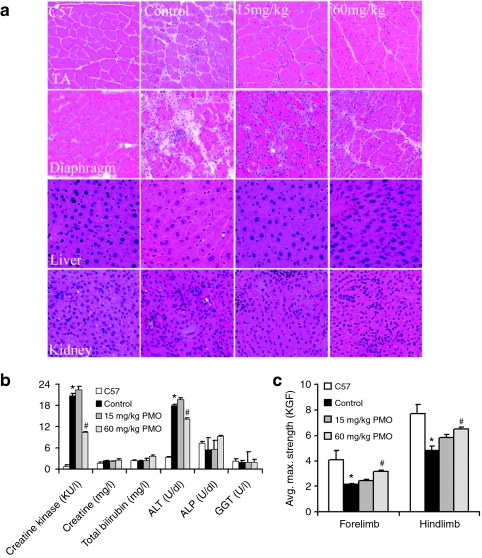Figure 2.
Examination of pathology, serum, and skeletal muscle function after 1-year treatment of 15 and 60 mg/kg phosphorodiamidate morpholino oligomers (PMO). (a) Histology [hematoxylin and eosin (H&E) staining] of tibialis anterior (TA), diaphragm, liver, and kidney from the normal C57BL/6 mice, untreated mdx mice (control), 15 or 60 mg/kg PMO-treated mdx mice (15 mg/kg, 60 mg/kg). (b) The levels of serum enzymes. Creatine kinase (KU/l), creatinine (mg/l), urea nitrogen (mg/ml), total bilirubin (mg/l), direct bilirubin (mg/dl), alanine transaminase (ALT) (U/dl), alkaline phosphatase (ALP) (U/dl), and γ-glutamyltransferase (GGT) (U/l). A significant reduction in creatine kinase levels was observed in mdx mice treated with 60 mg/kg PMO when compared with untreated mdx mice. (c) Grip strength measurement. Significant improvement was observed in the mice after treatment with 60 mg/kg PMO. KGF, kilogram force. (n = 10; *P ≤ 0.05 compared with C57BL/6 mice; #P ≤ 0.05 compared with untreated mdx mice. Two-tailed t-test). Final mean body weight: C57BL/6, 31.3 ± 0.8 g; untreated mdx, 34.1 ± 2.0; 15 mg/kg PMO-treated mdx, 31.8 ± 2.4 g; 60 mg/kg PMO-treated mdx, 33.7 ± 1.6 g. PMO, phosphorodiamidate morpholino oligomers.

